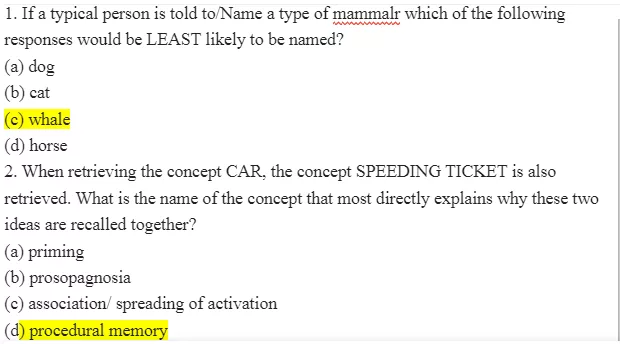Learning and Memory Psychology Quiz
1.If a typical person is told to/Name a type of mammalr which of the following responses would be LEAST likely to be named?
(a) dog
(b) cat
(c) whale
(d) horse
2.When retrieving the concept CAR, the concept SPEEDING TICKET is also retrieved. What is the name of the concept that most directly explains why these two ideas are recalled together?
(a) priming
(b) prosopagnosia
(c) association/ spreading of activation
(d) procedural memory
3.Adam is trying to remember information for his psychology exam, but similar information that he studied in sociology is also being retrieved, interfering with his thinking process. This interference is most similar to:
(a) priming
(b) the fan effect
(c) spreading of activation
(d) procedural memory
4.Ever since his car accident, Joe has difficulty remembering what his friends do for a living, although he can remember their names. This dysfunction is evidence for:
(a) the modularity of episodic memory
(b) the modularity of semantic memory
(c) the formation of an implicit memory
(d) the validity of spreading of activation
5.An early, but ultimately incorrect, approach to understanding the biology of memory was:
(a) the modularity approach
(b) long-term potentiation
(c) the formation of memory molecules
(d) all of the above
6.Remembering that improves over successive attempts at reproduction of the studied material is:
(a) hypermnesia
(b) encoding specificity
(c) distinctiveness
(d) none of the above
7. Motor skill learning has qualities that make it illustrative of:
(a) procedural learning
(b) declarative memory
(c) neither a or b
(d) both a and b
8.As Melanie sits in class paying attention to the new material being presented by her professor, this information, in its unconsolidated state, is likely being processed in which storage system?
(a) sensory memory
9.
10.
Learning and Memory Psychology Quiz-11.One study on remembering knowledge learned in school assessed learning 4 and 11 months after completion of a course. Grades fell about on the delayed tests.
(a) 10
(b) 20
(c) 50
(d) none of the above
12, O. After practicing all summer long, Madison has finally learned how to make a baseball curve when she throws it. This ability can best be described as:
(a) implicit learning
(b) spatial learning
(c) stimulus-response learning
(d) motor skill learning
Learni Theories
11.Tommy has been running the 1-mile race for his track team for the past 5 years. His best times in each of the past 5 years, respectively, have been 5:30,5:02,4:40,4:30, and 4:25. Assuming his training proceeds according to plan, which of the following times should he be capable of running
this year, according to the power law?
(a) 3:59
(b) 4:02
(c) 4:23
(d) 4:10
12. The power law focuses on the relationship between motor skills learning and:
(a) practice
(b) feedback
(c) motivation
(d) strength
13.Louie spent 4 hours yesterday afternoon learning how to ride a new ail-terrain vehicle, and had his competence tested over an obstacle course. He completed the course, but made 7 driving errors while on the course. After getting a good night’s rest (and without additional driving practice), Louie
returned to the course today and completed it with only 2 errors. This skill improvement is best referred to as:
(a) implicit learning
(b) practice independent learning
(c) practice dependent learning
(d) massed practice
14.Janet is learning how to type, in the context of a single-session lab-based psychology experiment. To maximize typing performance in this context, the best type of feedback should be delivered how soon after each typing trial?
(a) 1 minute
(b) 1 hour
(c) immediately
(d) 10 minutes.
15. The self-guidance hypothesis suggests that:
(a) frequent feedback is the best way to improve motor skills
(b) delayed feedback allows one to learn how to correct their own errors
(c) delayed feedback inhibits motor skill learning
(d) people can guide themselves when learning a motor skill-feedback is not necessary
16. Which individual is likely to show the best classical conditioning ability?
(a) a 27-yearold
(b) a 7-year-old
(c) a z-year-old
(d) a 72-year-old
17. Prenatal classical conditioning involves:
(a) exposing a child to a CS and US immediately after birth
(b) testing for a conditioned response at 1 month, and then 1 year, after birth
(c) exposing a fetus to CS-US pairings
(d) none of the above
18. Identical twins tend to show similar memory ability on tasks involving:
(a) short-term memory
(b) digit span
(c) sensory memory
(d) associative memory
19. Episodic memories can be assessed during infancy by using:
(a) classical conditioning
(b) habituation
(c) dishabituation
(d) none of the above
Learning and Memory Psychology Quiz-20. Childhood amnesia may be the result of:
(a) prenatal exposure to alcohol
(b) enhanced hippocampal activity during the first year of life
(c) well-formed meta memory skills
(d) diminished memory capacity during infancy, compared to adulthood
21.Very young children tend to rely on data to encode information, whereas older children and adults utilize data during encoding.
(a) sensory; motor
(b) sensory; verbal
(c) verbal; motor
(d) motor; sensory
22.Cindy, a 6-year-old, is presented with several random strings of letters to commit to memory. Which of the following strings is she most likely to remember in the correct order?
(a) RQY
(b) BHFZP
(c) MPLSTGX
(d) WYZDHLPMT
23. Developmental disabilities may be caused by:
(a) birth defects
(b) head injury
(c) malnutrition
(d) all of the above
24.In a l-roorn schoolhouse with students of all ages, Mr. Smith notices that some of his students are taking notes about what is being discussed in class, whereas others are not. Which of the following students would be most likely to be one of the students taking notes?
(a) Joe, a 5-year-old boy
(b) Jen, a 6-year-old girl
(c) Victor, a s-year-old boy
(d) Rhonda, a 12-year-old girl
25.Dr. Marie has a 23-year-old female patient that is having problems with her spatial memory. Giving this patient an estrogen supplement to boost her memory will likely have what effect on her memory dysfunction?
(a) it will eliminate it
(b) it will make it worse
(c) it will have no long term impact
(d) it will make her smarter
Answer Preview-Learning and Memory Psychology Quiz

